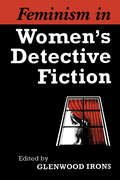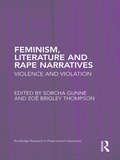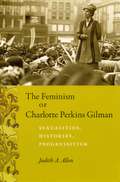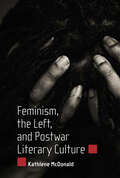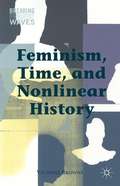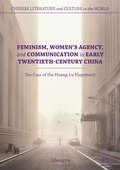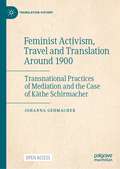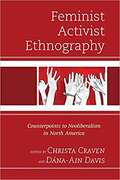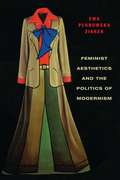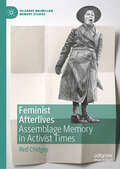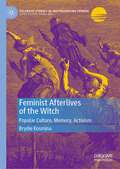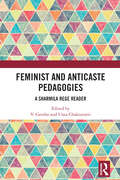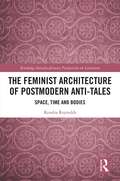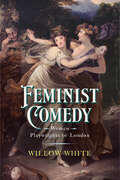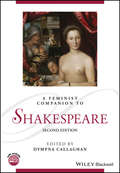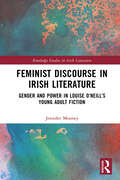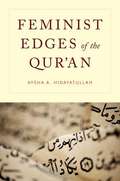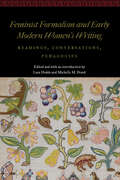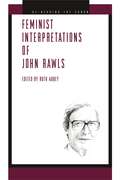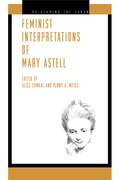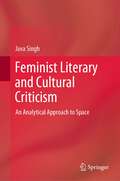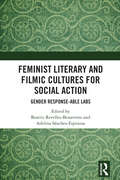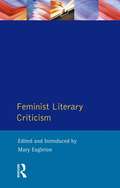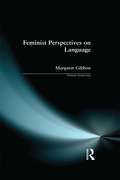- Table View
- List View
Feminism in Women's Detective Fiction
by Glenwood IronsNames such as Sherlock Holmes, Hercule Poirot, and Sam Spade are perhaps better known than the names of the authors who created them. The woman detective has also had worldwide appeal; yet, with the exception of Christie's Miss Marple, the names of female detectives and their authors have only recently gained wide attention through the popularity of Marcia Muller, Sue Grafton, and Sara Paretsky.The essays in this collection grapple with a wide range of issues important to the female sleuth - the most important, perhaps, being the oft-heard challenge to her suitability for the job. Not surprisingly, gender issues are the main focus of all the essays; indeed, in detective novels with a woman protagonist, these issues are often right at the surface.Some of the papers see the female sleuth as an important force in popular fiction, but many also challenge the notion that the woman detective is a positive model for feminists. They argue that fictional female sleuths have lost the `otherness' that a feminine approach to the genre should encourage. Collectively, the essays also reveal the differences between British and American perspectives on the woman detective.
Feminism, Literature and Rape Narratives: Violence and Violation (Routledge Research In Postcolonial Literatures Ser. #27)
by Sorcha Gunne Zoë Brigley ThompsonThe essays in this volume discuss narrative strategies employed by international writers when dealing with rape and sexual violence, whether in fiction, poetry, memoir, or drama. In developing these new feminist readings of rape narratives, the contributors aim to incorporate arguments about trauma and resistance in order to establish new dimensions of healing. This book makes a vital contribution to the fields of literary studies and feminism, since while other volumes have focused on retroactive portrayals of rape in literature, to date none has focused entirely on the subversive work that is being done to retheorize sexual violence. Split into four sections, the volume considers sexual violence from a number of different angles. 'Subverting the Story' considers how the characters of the victim and rapist might be subverted in narratives of sexual violence. In 'Metaphors for Resistance,' the essays explore how writers approach the subject of rape obliquely using metaphors to represent their suffering and pain. The controversy of not speaking about sexual violence is the focus of 'The Protest of Silence,' while 'The Question of the Visual' considers the problems of making sexual violence visible in the poetic image, in film and on stage. These four sections cover an impressive range of world writing which includes curriculum staples like Toni Morrison, Sarah Kane, Sandra Cisneros, Yvonne Vera, and Sharon Olds.
The Feminism of Charlotte Perkins Gilman: Sexualities, Histories, Progressivism
by Judith A. AllenJudith Allen provides the first comprehensive assessment of Gilman's complicated feminism by exploring the renowned writer's theories of sexuality and evolutionary analyses of androcentric or male-dominated culture.
Feminism, the Left, and Postwar Literary Culture
by Kathlene McDonaldThis book traces the development of a Left feminist consciousness as women became more actively involved in the American Left during and immediately following World War II. McDonald argues that women writers on the Left drew on the rhetoric of antifascism to critique the cultural and ideological aspects of women's oppression. In Left journals during World War II, women writers outlined the dangers of fascist control for women and argued that the fight against fascism must also be about ending women's oppression. After World War II, women writers continued to use this antifascist framework to call attention to the ways in which the emerging domestic ideology in the United States bore a frightening resemblance to the fascist repression of women in Nazi Germany. This critique of American domestic ideology emphasized the ways in which black and working-class women were particularly affected and extended to an examination of women's roles in personal and romantic relationships. Underlying this critique was the belief that representations of women in American culture were part of the problem. To counter these dominant cultural images, women writers on the Left depicted female activists in contemporary antifascist and anticolonial struggles or turned to the past, for historical role models in the labor, abolitionist, and antisuffrage movements. This depiction of women as models of agency and liberation challenged some of the conventions about femininity in the postwar era. The book provides a historical overview of women writers who anticipated issues about women's oppression and the intersections of gender, race, and class that would become central tenants of feminist literary criticism and black feminist criticism in the 1970s and 1980s. It closely considers works by writers both well-known and obscure, including Lorraine Hansberry, Alice Childress, Martha Dodd, Sanora Babb, and Beth McHenry.
Feminism, Time, and Nonlinear History
by Victoria BrowneInterweaving phenomenological, hermeneutical, and sociopolitical analyses, this book considers the ways in which feminists conceptualize and produce the temporalities of feminism, including the time of the trace, narrative time, calendar time, and generational time.
Feminism, Women's Agency, and Communication in Early Twentieth-Century China: The Case of the Huang-Lu Elopement (Chinese Literature and Culture in the World)
by Qiliang HeFeminism, Women’s Agency, and Communication in Early Twentieth-Century China focuses on a sensational elopement in the Yangzi Delta in the late 1920s to explore how middle- and lower-class members of society gained access to and appropriated otherwise alien and abstract enlightenment theories and idioms about love, marriage, and family. Via a network of communications that connected people of differing socioeconomic and educational backgrounds, non-elite women were empowered to display their new womanhood and thereby exercise their self-activating agency to mount resistance to China’s patriarchal system. Qiliang He’s text also investigates the proliferation of anti-feminist conservatisms in legal practice, scholarly discourses, media, and popular culture in the early Nanjing Decade (1927-1937). Utilizing a framework of interdisciplinary scholarship, this book traverses various fields such as legal history, women’s history, popular culture/media studies, and literary studies to explore urban discourse and communication in 1920s China.
Feminist Activism, Travel and Translation Around 1900: Transnational Practices of Mediation and the Case of Käthe Schirmacher (Translation History)
by Johanna GehmacherThis open access book takes the biographical case of German feminist Käthe Schirmacher (1865–1930), a multilingual translator, widely travelled writer of fiction and non-fiction, and a disputatious activist to examine the travel and translation of ideas between the women’s movements that emerged in many countries in the late 19th and early 20th century. It discusses practices such as translating, interpreting, and excerpting from journals and books that spawned and supported transnational civic spaces and develops a theoretical framework to analyse these practices. It examines translations of literary, scholarly and political texts and their contexts. The book will be of interest to academics as well as undergraduate and postgraduate students in the fields of modern history, women’s and gender history, cultural studies, transnational and transfer history, translation studies, history and theory of biography.
Feminist Activist Ethnography: Counterpoints to Neoliberalism in North America
by Christa Craven Dána-Ain Davis Mary K. Anglin Khiara M. Bridges Elizabeth Chin Aimee Cox Faye V. Harrison Iris López Michelle Marzullo Scott Lauria Morgensen Gina Pérez Tabitha Steager Beth A. Uzwiak Jennifer R. WiesWriting in the wake of neoliberalism, where human rights and social justice have increasingly been subordinated to proliferating “consumer choices” and ideals of market justice, contributors to this collection argue that feminist ethnographers are in a key position to reassert the central feminist connections between theory, methods, and activism. Together, we suggest avenues for incorporating methodological innovations, collaborative analysis, and collective activism in our scholarly projects. What are the possibilities (and challenges) that exist for feminist ethnography 25 years after initial debates emerged in this field about reflexivity, objectivity, reductive individualism, and the social relevance of activist scholarship? How can feminist ethnography intensify efforts towards social justice in the current political and economic climate? <p><p>This collection continues a crucial dialog about feminist activist ethnography in the 21st century—at the intersection of engaged feminist research and activism in the service of the organizations, people, communities, and feminist issues we study.
Feminist Aesthetics and the Politics of Modernism (Columbia Themes in Philosophy, Social Criticism, and the Arts)
by Ewa Płonowska ZiarekEwa Ziarek fully articulates a feminist aesthetics, focusing on the struggle for freedom in women's literary and political modernism and the devastating impact of racist violence and sexism. She examines the contradiction between women's transformative literary and political practices and the oppressive realities of racist violence and sexism, and she situates these tensions within the entrenched opposition between revolt and melancholia in studies of modernity and within the friction between material injuries and experimental aesthetic forms. Ziarek's political and aesthetic investigations concern the exclusion and destruction of women in politics and literary production and the transformation of this oppression into the inaugural possibilities of writing and action. Her study is one of the first to combine an in-depth engagement with philosophical aesthetics, especially the work of Theodor W. Adorno, with women's literary modernism, particularly the writing of Virginia Woolf and Nella Larsen, along with feminist theories on the politics of race and gender. By bringing seemingly apolitical, gender-neutral debates about modernism's experimental forms together with an analysis of violence and destroyed materialities, Ziarek challenges both the anti-aesthetic subordination of modern literature to its political uses and the appreciation of art's emancipatory potential at the expense of feminist and anti-racist political struggles.
Feminist Afterlives: Assemblage Memory in Activist Times (Palgrave Macmillan Memory Studies)
by Red ChidgeyThis book interrogates why feminist memories matter. Feminist Afterlives explores how the images, ideas and feelings of past liberation struggles become freshly available and transmissible. In doing so, Red Chidgey examines how popular feminist memories travel as digital and material resources across protest, heritage, media, commercial and governmental sites, and in connection with the concerns and conditions of the present. Central case studies track repeated invocations to militant suffragettes and the We Can Do It! post-feminist icon over time and space. Assembling interviews, archival research and ethnographic accounts with provocative examples drawn from postfeminist media culture, a UNESCO heritage bid, protest at the London 2012 Olympic Games, and activist remembrance in zines and blogs, this is a broad-ranging study of ‘restless’ feminist pasts – both real and imagined. Richly researched and argued, this volume offers an original framework of ‘assemblage memory’ and sets out a new research agenda for the intersections between everyday activism, protest, and memory practices.
Feminist Afterlives of the Witch: Popular Culture, Memory, Activism (Palgrave Studies in (Re)Presenting Gender)
by Brydie KosminaThe book investigates the witch as a key rhetorical symbol in twentieth- and twenty-first century feminist memory, politics, activism, and popular culture. The witch demonstrates the inheritance of paradoxical pasts, traversing numerous ideological memoryscapes. This book is an examination of the ways that the witch has been deployed by feminist activists and writers in their political efforts in the twentieth century, and how this has indelibly affected cultural memories of the witch and the witch trials, and how this plays out in popular culture representations of the symbol through the twentieth and twenty-first centuries. Consequently, this book considers the relationship between popular culture and media, activist politics, and cultural memory. Using hauntological theories of memory and temporality, and literary, screen, and cultural studies methodologies, this book considers how popular culture remembers, misremembers, and forgets usable pasts, and the uses (and misuses) of these memories for feminist politics. Given the ubiquity of the witch in popular culture, politics and activism since 2016, this book is a timely examination of the range of meanings inherent to the figure, and is an important study of how cultural symbols like the witch inherit paradoxical memories, histories, and politics. The book will be valuable for scholars across disciplines, including witchcraft studies, feminist philosophy and history, memory studies, and popular culture studies.
Feminist and Anticaste Pedagogies: A Sharmila Rege Reader
by Uma Chakravarti V. GeethaThis book comprises the collected essays of Sharmila Rege (1964 – 2013), which span a range of themes, including critical perspectives on women’s movements, Dalit standpoint feminism, and the relationship between Women’s Studies and other disciplines. Written over two decades and more (from the 1990s to 2010), these pioneering essays draw from the struggles and writings of Dalit women, the long history of anticaste thought in Maharashtra and global feminist debates. Equally, they address enduring concerns to do with caste and gender, and call attention to the inseparability of struggles against caste and patriarchy.Framed and annotated by an introduction that places Sharmila's work in the intellectual and historical contexts that shaped it, the volume also features short prefatory notes by her colleagues on the various themes taken up for discussion. Addressing, as it does, the researcher, the activist and the teacher, the book is indispensable for students and researchers of women’s studies, feminism, gender studies, Dalit studies, minority studies, Sociology, as well as studies in language and rhetoric.
The Feminist Architecture of Postmodern Anti-Tales: Space, Time, and Bodies (Routledge Interdisciplinary Perspectives on Literature)
by Kendra ReynoldsThis monograph aims to counter the assumption that the anti-tale is a ‘subversive twin’ or dark side of the fairy tale coin, instead it argues that the anti-tale is a genre rich in complexity and radical potential that fundamentally challenges the damaging ideologies and socializing influence of fairy tales. The Feminist Architecture of Postmodern Anti-Tales: Space, Time and Bodies highlights how anti-tales take up timely debates about revising old structures, opening our minds up to a broader spectrum of experience or ways of viewing the world and its inhabitants. They show us alternative architectures for the future by deconstructing established spatio-temporal laws and structures, as well as limited ideas surrounding the body, and ultimately liberate us from the shackles of a single-minded and simplistic masculine reality currently upheld by dominant social forces and patriarchal fairy tales themselves. It is only when these masculine fairy tales and social architectures are deconstructed that new, more inclusive feminine realities and futures can be brought into being.
Feminist Comedy: Women Playwrights of London (EARLY MODERN FEMINISMS)
by Willow WhiteFeminist Comedy: Women Playwrights of London identifies the eighteenth-century comedic stage as a key site of feminist critique, practice, and experimentation. While the history of feminism and comedy is undeniably vexed, by focusing on five women playwrights of the latter half of the eighteenth century--Catherine Clive, Frances Brooke, Frances Burney, Hannah Cowley, and Elizabeth Inchbald--this book demonstrates that stage comedy was crucial to these women’s professional success in a male-dominated industry and reveals a unifying thread of feminist critique that connects their works. Though male detractors denied women’s comic ability throughout the era, eighteenth-century women playwrights were on the cutting edge of comedy and their work had important feminist influence that can be traced to today’s stages and screens.
A Feminist Companion to Shakespeare
by Dympna CallaghanThe question is not whether Shakespeare studies needs feminism, but whether feminism needs Shakespeare. This is the explicitly political approach taken in the dynamic and newly updated edition of A Feminist Companion to Shakespeare. Provides the definitive feminist statement on Shakespeare for the 21st century Updates address some of the newest theatrical andcreative engagements with Shakespeare, offering fresh insights into Shakespeare's plays and poems, and gender dynamics in early modern England Contributors come from across the feminist generations and from various stages in their careers to address what is new in the field in terms of historical and textual discovery Explores issues vital to feminist inquiry, including race, sexuality, the body, queer politics, social economies, religion, and capitalism In addition to highlighting changes, it draws attention to the strong continuities of scholarship in this field over the course of the history of feminist criticism of Shakespeare The previous edition was a recipient of a Choice Outstanding Academic Title award; this second edition maintains its coverage and range, and bringsthe scholarship right up to the present day
Feminist Discourse in Irish Literature: Gender and Power in Louise O’Neill’s Young Adult Fiction (Routledge Studies in Irish Literature)
by Jennifer MooneyFeminist Discourse in Irish Literature addresses the role of young adult (YA) Irish literature in responding and contributing to some of the most controversial and contemporary issues in today’s modern society: gender, and conflicting views of power, sexism and consent. This volume provides an original, innovative and necessary examination of how “rape culture” and the intersections between feminism and power have become increasingly relevant to Irish society in the years since Irish author Louise O’Neill’s novels for young adults Only Ever Yours and Asking For It were published. In consideration of the socio-political context in Ireland and broader Western culture from which O’Neill’s works were written, and taking into account a selection of Irish, American, Australian and British YA texts that address similar issues in different contexts, this book highlights the contradictions in O’Neill’s works and illuminates their potential to function as a form of literary/social fundamentalism which often undermines, rather than promotes, equality.
Feminist Edges Of The Qur'an
by Aysha HidayatullahAysha A. Hidayatullah offers the first comprehensive examination of contemporary feminist Qur'anic interpretation, exploring its dynamic challenges to Islamic tradition and contemporary Muslim views of the Qur'an. She analyzes major feminist readings of the Qur'an beginning in the late twentieth century, synthesizing their common concepts and methods and revealing their vital part in the development of the nascent field of Qur'anic tafsir (exegesis).Hidayatullah contributes her own critical assessment of feminist ''impasses'' in the Qur'anic text and the field's appeals to the principles of equality and justice. She expands these observations into a radical critique of feminist approaches to the Qur'an, arguing that the feminist exegeticalendeavor has reached a point of irresolvable contradiction by making claims about the Qur'an that are not fully supported by the text. Hidayatullah outlines major challenges to the authority of feminist interpretations of the Qur'an and interrogates the feminist premises on which they have relied, questioning the viability of current strands of feminist Qur'anic interpretation and proposing a major revision of its exegetical positions.An innovative work of Muslim feminist theology, this volume offers an essential contribution to conversations about feminist tafsir and asking bold questions at the ''edge'' of Qur'anic interpretation.
Feminist Formalism and Early Modern Women's Writing: Readings, Conversations, Pedagogies (Women and Gender in the Early Modern World)
by Lara Dodds Michelle M. DowdFeminist Formalism and Early Modern Women&’s Writing reexamines the relationship between gender and form in early modern women&’s writing in essays that elaborate the specific literary strategies of women writers, that examine women&’s debts to and appropriations of different literary genres, and that offer practical suggestions for the teaching of women&’s texts in several different contexts. Contributors explore the possibility of feminist formalism, a methodology that both attends to the structural, rhetorical, and other formal techniques of a given text and takes gender as a central category of analysis. This collection contends that feminist formalism is a useful tool for scholars of the early modern period and for literary studies more broadly because it marries the traditional questions of formalism—including questions of style, genre, and literary history—with the political and cultural concerns of feminist inquiry. Contributors reposition works by important women writers—such as Margaret Cavendish, Hester Pulter, Mary Wroth, and Katherine Philips—as central to the development of English literary tradition. By examining a variety of texts written by women, including recipes, emblems, exchanges, and poetry, Feminist Formalism and Early Modern Women&’s Writing contributes to existing scholarship on early modern women&’s writing while extending it in new and important directions.
Feminist Interpretations of John Rawls: Feminist Interpretations Of John Rawls (Re-Reading the Canon)
by Ruth AbbeyIn Feminist Interpretations of John Rawls, Ruth Abbey collects eight essays responding to the work of John Rawls from a feminist perspective. An impressive introduction by the editor provides a chronological overview of English-language feminist engagements with Rawls from his Theory of Justice onward. Abbey surveys the range of issues canvassed by feminist readers of Rawls, as well as critics’ wide disagreement about the value of Rawls’s corpus for feminist purposes. The eight essays that follow testify to the continuing ambivalence among feminist readers of Rawls. From the perspectives of political theory and moral, social, and political philosophy, the contributors address particular aspects of Rawls’s work and apply it to a variety of worldly practices relating to gender inequality and the family, to the construction of disability, to justice in everyday relationships, and to human rights on an international level. The overall effect is to give a sense of the broad spectrum of possible feminist critical responses to Rawls, ranging from rejection to adoption.Aside from the editor, the contributors are Amy R. Baehr, Eileen Hunt Botting, Elizabeth Brake, Clare Chambers, Nancy J. Hirschmann, Anthony Simon Laden, Janice Richardson, and Lisa H. Schwartzman.
Feminist Interpretations of John Rawls (Re-Reading the Canon)
by Ruth AbbeyIn Feminist Interpretations of John Rawls, Ruth Abbey collects eight essays responding to the work of John Rawls from a feminist perspective. An impressive introduction by the editor provides a chronological overview of English-language feminist engagements with Rawls from his Theory of Justice onward. Abbey surveys the range of issues canvassed by feminist readers of Rawls, as well as critics’ wide disagreement about the value of Rawls’s corpus for feminist purposes. The eight essays that follow testify to the continuing ambivalence among feminist readers of Rawls. From the perspectives of political theory and moral, social, and political philosophy, the contributors address particular aspects of Rawls’s work and apply it to a variety of worldly practices relating to gender inequality and the family, to the construction of disability, to justice in everyday relationships, and to human rights on an international level. The overall effect is to give a sense of the broad spectrum of possible feminist critical responses to Rawls, ranging from rejection to adoption.Aside from the editor, the contributors are Amy R. Baehr, Eileen Hunt Botting, Elizabeth Brake, Clare Chambers, Nancy J. Hirschmann, Anthony Simon Laden, Janice Richardson, and Lisa H. Schwartzman.
Feminist Interpretations of Mary Astell (Re-Reading the Canon)
by Penny A. Weiss Alice SowaalOften referred to as a proto-feminist, early modern English philosopher and rhetorician Mary Astell was a pious supporter of monarchy who wrote about gender equality at a time when society tightly constrained female agency. This diverse collection of essays situates her ideas in feminist, historical, and philosophical contexts. Focusing on Astell’s work and thought, this book explores the degree to which she can be considered a “feminist” in light of her adherence to Cartesianism, Christian theology, and Tory politics. The contributors explore the philosophical underpinnings of Astell’s outspoken advocacy for the autonomy and education of women; examine the intricacies underlying her theories of power, community, and female resistance to unlawful authority; and reveal the similarities between her own philosophy of gender and sexual politics and feminist theorizing today.A broad-ranging look at one of the most important female writers of the seventeenth and eighteenth centuries, this volume will be especially valuable to students and scholars of feminist history and philosophy and the early modern era.Aside from the editors, the contributors are Kathleen A. Ahearn, Jacqueline Broad, Karen Detlefsen, Susan Paterson Glover, Marcy P. Lascano, Elisabeth Hedrick Moser, Christine Mason Sutherland, and Nancy Tuana.
Feminist Literary and Cultural Criticism: An Analytical Approach to Space
by Java SinghFeminist Literary and Cultural Criticism explores inter-disciplinary connections across Cultural Anthropology, Geography, Psychology, and feminist literary criticism to develop a theoretical framework for spatial criticism. Using the spatial gynocritics framework developed in the book, it analyzes selected texts from five different genres–short-story, novel, film, cartoons, and OTT series, created by women. The creators discussed in the book constitute a transnational collectivity of women that shares common concerns about gender, environment, technology, and social hierarchies. They comprise a geographically and linguistically diverse group from India, Uruguay, Spain, Argentina, and the USA. The book offers immense potential for a comparative study on numerous aspects, among which the present work concentrates on the treatment of Space, demonstrating that spatial logic and grammar are essential elements of the feminist praxis. The book reveals the unexamined potential in the women creators’ praxis of destabilizing, decentring, and destroying the ascribed centres around which social arrangements are structured. Moreover, the book offers valuable analytic tools that add to scholarship in literary theory, comparative cultural studies, comparative literature, gender studies, feminist criticism, and interdisciplinary humanities. It is an indispensable aid to students and faculty in these areas of study, enabling them to critique texts from a fresh perspective.
Feminist Literary and Filmic Cultures for Social Action: Gender Response-able Labs
by Beatriz Revelles-Benavente Adelina Sánchez-EspinosaFeminist Literary and Filmic Cultures for Social Action: Gender Response-able Labs examines teaching and research practices under feminist new materialisms, affect theories and response-ability through literary and visual products, and offers possible bridges between academia and activism to create feminist interventions in contemporary neoliberal structures.Featuring chapters from contributors across a wide range of disciplines, this book follows a methodological framework that blends traditionally opposite categories, such as theory and practice, and explores contemporary literature and films as case studies within innovative “feminist response-able labs”.In Feminist Literary and Filmic Cultures for Social Action readers will encounter a collaborative trans-disciplinary toolbox which can be of use to multiple disciplines and an invaluable resource to advanced undergraduate students, postgraduate researchers and scholars in literary studies, film studies, feminist theories, new materialisms, and affective pedagogies
Feminist Literary Criticism (Longman Critical Readers)
by Mary EagletonLooks at the work of a range of critics, including Elaine Showalter, Kate Millett, Gayatri Chakravorty Spivak and the French feminists. The critical approaches encompass Marxist feminism and contemporary critical theory as well as other forms of discourse. It also provides an overview of the developments in feminist literary theory, and covers all the major debates within literary feminism, including "male feminism".
Feminist Perspectives on Language (Feminist Perspectives)
by Margaret GibbonThe Feminist Perspectives Series seeks to provide concise, accessible and engaging introductions to key feminist topics and debates. The texts in the series are designed to be used on a wide range of courses exploring feminist issues and are written by experienced teachers who are also well known in their respective fields. Each book in the series includes the most up-to-date statistics, research data, key sources and suggestions for further reading.Feminist Perspectives On Language provides an accessible introduction to this complex area. It redresses the balance of current feminist texts which tend to concentrate on discourse analysis and fail to connect with feminist thought in other disciplines such as sociology and politics. The text is divided into two parts, the first looks at language itself, how we learn language exploring such questions as; Does language free or trap us? Does our language affect how we come to understand the world around us? Is our language sexist? If so, does that reflect male dominance in society? and many more issues. Part Two explores questions of methodology and interpretation examining language in use, communication styles and the analysis of conversation.
